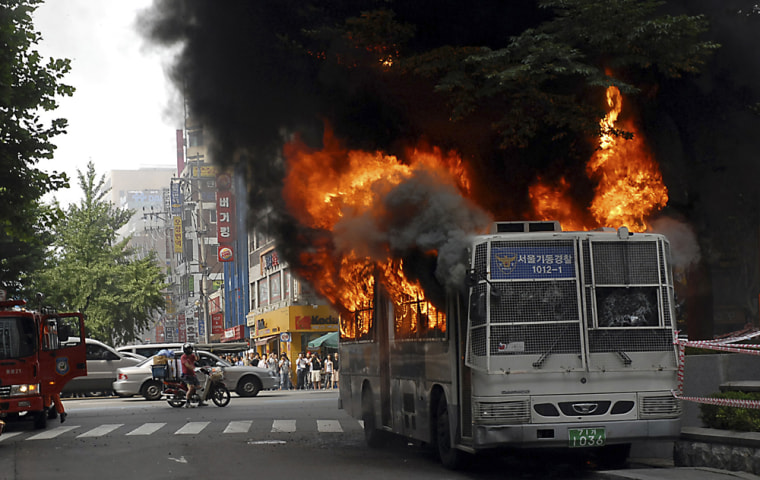South Korea's government vowed to use "all means" possible to end violent anti-government protests, saying Tuesday that the daily rallies were putting further strains on the nation's already troubled economy.
The streets of central Seoul have often turned into battlefields in recent weeks, as stick-wielding protesters faced off against police barricades and water cannons. Demonstrators have repeatedly attempted to march on the office of President Lee Myung-bak, who took office in February, to protest a beef import deal with the United States.
The protests, which drew up to 80,000 people in June, have dwindled in size but have become more violent. The worst clash occurred Saturday night, when more than 200 protesters and riot police were injured.
"Related ministries and agencies, including police and the prosecution, should employ all means allowed by law to root out illegal, violent rallies and restore the order of law," Prime Minister Han Seung-soo told a Cabinet meeting, according to a government Web site.
Protesters have demanded the government renegotiate the April beef deal with the United States due to concerns about mad cow disease, and the backlash prompted Seoul to win amendments to the agreement last month that added health safeguards. The government has rejected full renegotiations, saying that would hurt Seoul's credibility.
Ordinary citizens used to make up a large portion of the daily candlelight rallies, with mothers concerned over food safety turning out at street protests with baby strollers. But the government now believes that anti-government activists are stoking the continuing demonstrations.
"What began as a peaceful candlelight rally has changed in nature to a point where it is difficult to see any purity" in its cause, Han said.
On Monday, police raided the offices of two civic groups that led the protests, seizing computers, documents and materials used during rallies. One senior civic group official was arrested on charges of instigating violent protests.
About 8,000 protesters gathered Monday evening but no clashes occurred, police said.
Han also said the nation's economic situation "has worsened by an unimaginable degree" as the rallies are turning foreign investors away and causing South Korea's international standing to fall.
"Anyone can feel that an economic crisis is slowly approaching," Han said.
Public apology
South Korea's central Bank of Korea lowered its economic growth forecast Tuesday to 4.6 percent from 4.7 percent, saying sluggish domestic demand was unlikely to pick up this year.
Public outrage over the April beef deal has forced the president to publicly apologize and replace his top advisers. The Cabinet has also offered to resign.
U.S. beef was banned for most of the past 4 1/2 years, since the first case of mad cow disease in the United States was discovered in late 2003. Eating meat products contaminated with mad cow disease is linked to variant Creutzfeldt-Jakob disease, a rare and fatal human malady.
